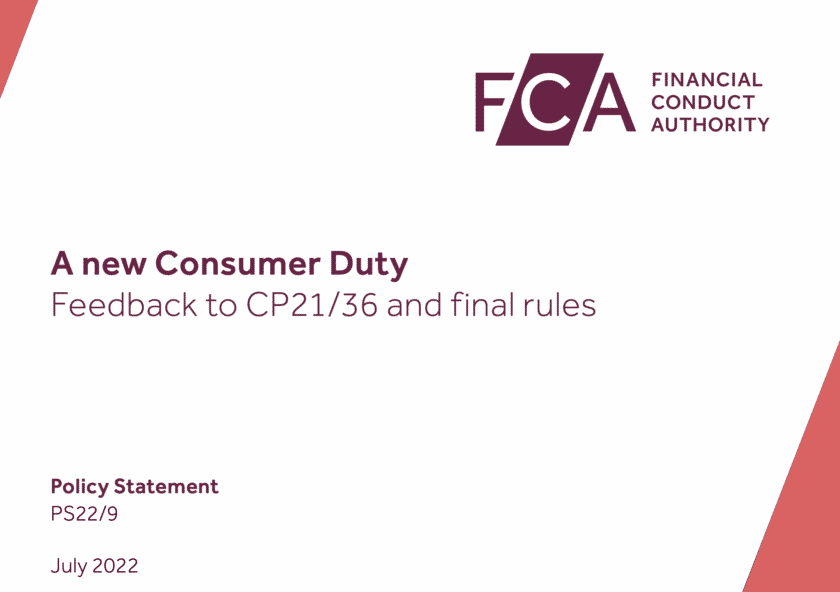New rules for the financial services industry published by the FCA on 27 July, have been described as ‘far reaching’ impact that will ‘fundamentally reshape financial services in the UK’.
They largely followed the proposals in the two consultations papers from last year, CP21/13 and CP21/36, but the regulator has extended the implementation date from April to July 2023 and given product manufacturers an additional 12 months to bring legacy products into line.
The new rules, addressed in a set of ‘Principles’, establish a higher standard for retail financial services firms, with the aim of ensuring ‘good outcomes’ for savers and investors.
The FCA said the new rules “require firms to consider the needs, characteristics and objectives of their customers – including those with characteristics of vulnerability – and how they behave, at every stage of the customer journey.
“As well as acting to deliver good customer outcomes, firms will need to understand and evidence whether those outcomes are being met.”
This will mean that “consumers should receive communications they can understand, products and services that meet their needs and offer fair value, and they get the customer support they need, when they need it.”
The regulator seemingly responded to criticisms that in the past it has failed to be pro-active in preventing financial abuse, saying the Duty “forms part of the FCA’s transformation to becoming a more assertive and data-led regulator.
“With firms assessing how they’re meeting their customers’ needs, the FCA will be able to quickly identify practices that don’t deliver the right outcomes for consumers and take action before practices become entrenched as market norms.”
Sheldon Mills, executive director of Consumers and Competition at the Regulator said: “The current economic climate means it’s more important than ever that consumers are able to make good financial decisions. The financial services industry needs to give people the support and information they need and put their customers first.
“The Consumer Duty will lead to a major shift in financial services and will promote competition and growth based on high standards. As the Duty raises the bar for the firms we regulate, it will prevent some harm from happening and will make it easier for us to act quickly and assertively when we spot new problems.”
The shift to outcomes-focused regulation is described by the industry as “ambitious” and “far-reaching”, “arguably the biggest domestic regulatory overhaul in almost a decade.”
By the end of October 2022, the FCA expects firms’ boards to have agreed their implementation plans and “be able to evidence they have scrutinised and challenged the plans to ensure they are deliverable and robust to meet the new standards.” The regulator goes on to say, “firms should expect to be asked to share implementation plans, board papers and minutes with supervisors and be challenged on their contents”.
David Tiller, commercial and propositions director at Quilter, said: “Firms will have to re-evaluate how they collect and collate data; implement a wave of new procedures and ensure culture is laser-focused on good customer outcomes.”
He added: “Financial advice firms have proven time again to be incredibly resilient to change and most will be building on strong foundations but will have work to do to prove the value of their services.
“However, it is far too simplistic to link value to the cheapest price, given that the Consumer Duty also focuses on the avoidance of foreseeable harm. Customers will need to accurately understand the value of what they are paying for and the limitations that could reasonably cause foreseeable harm. For example, it is foreseeable that a pension that is insufficiently flexible may not meet a customer’s future income needs. The regulator’s view is clear – firms must ensure there is a reasonable relationship between the price a consumer pays for a product or service and the benefits they receive from it. Clear causal links must be made to the customer outcome, with measurable value assessments.
“That’s why, as we implement the Consumer Duty, we have to ensure that we can explain the value of advice in an evidential and data-driven way. This includes considering total fees and the end-to-end value provided to the client. Driving down a fee in one place in exchange for a higher one elsewhere simply won’t fly. Platforms and investment business have to do their bit by clearly explaining the value of their services and supporting advisers with reporting in an efficient manner.
“Firms will have to become more customer oriented before the point of sale as well as after. This will include clear segmentation of target markets to consider their characteristics and vulnerabilities – traits that advisers are well placed to identify. With the Consumer Duty, the future is no longer binary. It’s no longer just about what clients pay, it’s about the value provided and the impact this has on customers achieving their outcomes.”
Steven Cameron, pensions director at Aegon said the new rules would involve “a fundamental industry-wide review to make sure products and services meet customer needs and offer fair value, testing customers can understand all forms of communication and examining whether customer support is truly meeting needs.”
Carrying out such an “all-encompassing review” thoroughly will take time, he added. “We’re pleased the FCA has listened to requests for an extended and prioritised timeline. Deferring the deadline for ‘open’ products and services, albeit by only three months till July 2023, is welcome but timelines remain tight. The extra year to implement changes for legacy books closed to new business is also helpful, particularly for firms with policies many decades old, with policy conditions written for a very different world. It’s in everyone’s interests, including consumers, that priority improvements are delivered first.”
Barry Neilson, chief commercial officer at Novia said the platform believed most financial planning practices will already be aligned to the new principle and operate businesses “with cultures and processes that put good client outcomes at the heart of everything they do”.
“The additional challenge facing many firms across the distribution chain will be to better source and harness data to evidence and document adherence to the new principle, the cross-cutting rules and the four outcomes.”
This, he said, would likely “put more onus on platforms to be sharing more detailed data, especially relating to servicing standards, and for advisers to adopt new metrics to better measure client understanding and satisfaction levels.”
He added that a consequence of the need for greater data exchange may be that advisers look to reduce the number of platforms and other providers they use “in a bid to establish fewer relationships which offer a much deeper and consistent sharing of data.”
In addition, Neilson said the new rules were likely to accelerate the need for the platform industry to “address the issue of inconsistent approaches to transfers and re-registrations between providers to ensure customers seeking to move are serviced in a timely and straightforward manner, minimising the delays and friction that are still all too often features of these processes”.
Verona Kenny, managing director, Intermediary at 7IM said: “We applaud the regulator for bringing in rules which require our industry to follow standards that will drive better outcomes for clients.“We are currently working through the regulations and will be implementing them within the 12-month period, while, of course, working closely with all the adviser firms we partner with to support them with their own implementation of the rules. After all, Consumer Duty impacts our entire industry so the more we get together to implement the rules, the better the outcomes are likely to be for clients.”
The full effect of the 160-page Policy Statement on the various parts of the industry will be better understood over the next few weeks.
The full Statement can be read HERE.



























